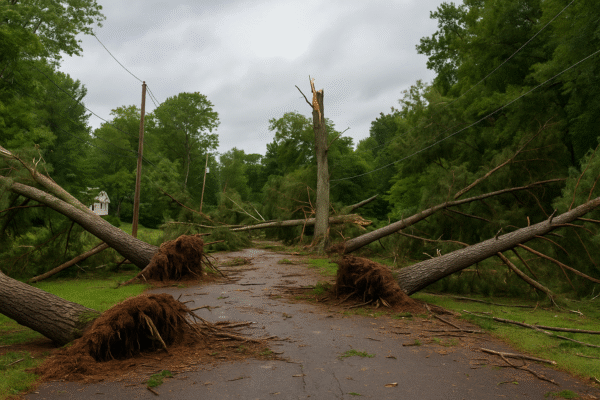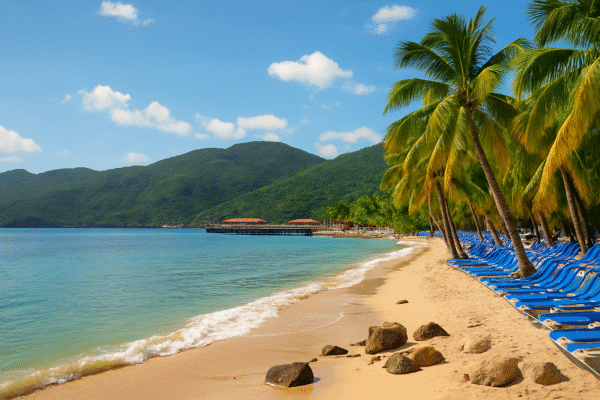Royal Caribbean International has announced that it will suspend all cruise visits to Labadee, Haiti, until spring 2026. The decision, made in response to growing security concerns in the region, highlights the challenges facing Haiti’s tourism industry and the cruise sector at large. Labadee has long been one of Royal Caribbean’s signature private destinations, offering travelers access to pristine beaches, thrilling excursions, and a taste of local culture. The suspension marks a turning point for both the company and the communities that rely on cruise tourism for economic stability.
Labadee’s Place in Caribbean Tourism
For decades, Labadee has been a vital component of Royal Caribbean’s itineraries in the Caribbean. Located on Haiti’s northern coast, the destination welcomed thousands of visitors each year who came to enjoy activities like zip-lining over the ocean, kayaking through turquoise waters, and relaxing on sun-soaked beaches.
The site was more than just a tourist attraction; it was a key source of income for local vendors, artisans, and excursion providers. Small businesses and families in the area depended on the steady flow of cruise passengers to sustain their livelihoods. With Royal Caribbean’s decision to halt visits for more than a year, Haiti’s tourism industry faces a substantial setback.
Immediate Impacts on Local Communities
The suspension of cruises to Labadee has an immediate and tangible effect on the communities that have long supported the tourism sector. Vendors who sell handmade crafts, jewelry, and souvenirs are likely to see sharp declines in income. Tour guides and operators, who lead cultural excursions and outdoor adventures, now face uncertainty in maintaining their businesses.
The loss extends beyond direct employment. Transportation providers, food suppliers, and workers in hospitality all feel the ripple effects of reduced cruise traffic. In a country where tourism plays a vital role in the economy, this disruption deepens the challenges already faced by local industries.
Economic Ramifications for Haiti
Tourism is one of Haiti’s most important economic drivers, contributing to foreign exchange earnings and supporting job creation. The halt of Royal Caribbean’s visits to Labadee until 2026 means that Haiti will lose a major portion of cruise-based income. This decline may discourage future tourism investments in the region, as concerns about security and infrastructure could deter investors from developing new projects.
Local businesses that had been rebuilding after the pandemic now face a renewed struggle. Without cruise visitors, small enterprises must explore new markets or risk closing. In the broader picture, reduced tourism also impacts national revenue streams, adding to the country’s financial pressures.
A Setback for Haiti’s Recovery
Haiti has long sought to strengthen its position in the Caribbean tourism market, but natural disasters, political instability, and security challenges have hindered progress. Labadee was often viewed as a safe and controlled introduction for international travelers to experience Haiti, even if only briefly. Without that gateway, the nation risks losing visibility in the competitive tourism landscape.
The perception of safety is central to international travel decisions. With cruise lines suspending stops in Haiti, the destination may struggle to attract new visitors, delaying recovery for years to come.
Opportunities Amid Challenges
Despite the setback, Haiti’s tourism industry has opportunities to adapt and evolve. The closure of Labadee could encourage stakeholders to explore alternative forms of tourism that go beyond cruise ships. Eco-tourism, adventure tourism, and cultural tourism are areas with potential growth.
Haiti is rich in natural resources, heritage sites, and cultural traditions. By promoting experiences such as hiking in the mountains, exploring historic sites, and showcasing local music and art, the country can diversify its tourism appeal. These forms of tourism often attract travelers seeking authentic, sustainable experiences, which can spread economic benefits more evenly across communities.
The government, local tourism boards, and international partners may also need to prioritize investment in safety measures and infrastructure. By addressing the concerns that led to Royal Caribbean’s decision, Haiti could improve its standing as a destination capable of hosting both cruise and land-based tourism.
Royal Caribbean’s Commitment to Safety
For Royal Caribbean, the suspension underscores the importance of passenger safety in the cruise industry. Cruise lines operate under strict standards to protect guests and crew, and decisions to suspend or reroute itineraries are not taken lightly. By delaying cruises to Labadee until conditions improve, the company reinforces its commitment to maintaining safe and enjoyable travel experiences.
Passengers who once enjoyed Labadee’s beaches and attractions will now see alternate destinations in their itineraries, such as stops in the Bahamas, St. Thomas, or Puerto Rico. While these destinations offer unique experiences, the absence of Labadee leaves a noticeable gap in Royal Caribbean’s Caribbean offerings.
Looking Ahead: A Path Forward
Although the suspension of cruises to Labadee represents a setback, it is not the end of Haiti’s tourism story. The challenge lies in turning this pause into an opportunity for reinvention. Local businesses may need to shift toward land-based tourism, targeting international travelers who wish to experience Haiti more deeply.
Strategic partnerships, investment in safety, and promotion of Haiti’s cultural and natural assets will be critical for long-term growth. Diversifying tourism offerings could make the industry more resilient to external shocks and reduce reliance on cruise visitors alone.
Conclusion
Royal Caribbean’s decision to suspend visits to Labadee until 2026 marks a major shift in the Caribbean tourism landscape. For Haiti, the closure represents both a challenge and an opportunity. The immediate impact on local communities and the broader economy is significant, but with the right strategies, Haiti could emerge stronger by diversifying its tourism sector and investing in sustainable practices.
The next few years will be crucial in shaping Haiti’s tourism future. As conditions improve, there remains hope that Labadee will once again welcome travelers and reestablish its role as a vibrant stop on Caribbean itineraries. Until then, Haiti faces the challenge of adapting, rebuilding, and reimagining its place in the global tourism industry.
For more travel news like this, keep reading Global Travel Wire
















